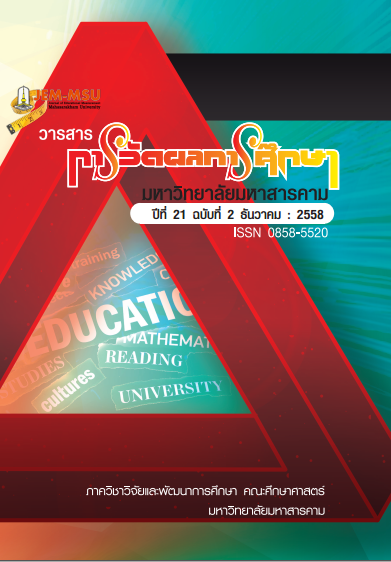ความสัมพันธ์ของปัจจัยบางประการกับความสามารถในการแก้ปัญหา และความสามารถในการให้เหตุผลทางคณิตศาสตร์ ของนักเรียนระดับชั้นมัธยมศึกษาปีที่ 3 สังกัดสำนักงานเขตพื้นที่การศึกษาประถมศึกษามหาสารคาม
Main Article Content
Abstract
Holding instruction for learners in a way which the learners can percrive
knowledge understandably and reasonably is better than in a way of content chanting.
Promoting the ability of giving a reason concerning mathematics is very necessary for
mathematical-problem solution of students, Thus, this research aimed at studying the
relation and canonical correlation of some foctors affecting problem-solving and the
ability to give a reason concerning mattermatics of Matthayom Suaksa 3 students. A
sample was 369 Matthayom Suaksa students selected by a multi-stage random
sampling from 12 schools under Mahasarakham Secondary Educational Service Area
Office in semester 2 of academic rear 2012. Research instruments were a problemsolving from of 20 questions with its difficulty per question beginning from .35 to.65, its discrimination per question beginning from .34 to .72, had its discrimination of
all questions was .93, a test from of the ability to give a reason concerning
mattermatics of 30 questions with its difficulty per question beginning from .32
to .65, its discrimination per question beginning from .34 to .72, and its reliability
of all questions was .93, a basic mathematical test from of 30 questions which
each question had 4 choices with its difficulty per question beginning from .29
to .65, its discrimination per question beginning from .36 to .73, and its reliability
of all questions was .92, and an evaluation from of factors affecting problemsolving and the ability to give a reason concerning mathematics of 50 questions
which each question evaluated is 5 rating scales with its discrimination per
question beginning from 0.32 to 0.86 and its reliability of all questions was .97.
Statistical methods used for analizing data were percentage, mean, standard
deviation, and Canonical correlation.
Research results revealed the following:
1. In terms of the relation between a set of estimation variables, the
factors affecting problem-solving ability and the ability to give a reason concerning
mathematics of 6 variables and the criterion variables of problem-solving and the
ability to give a reason concerning mathematics had the relation with in one set at
a .01 of statistical significant level. Considering the variances of canonical correlation
were .360 and .011, it indicated that the covariances were 36.0 and 1.1
2. In terms of Canonical correlation between a group of 6 estimation
variables and others, it had the relation with a group of 2 criterion variables
with canonical correlation at a .01 of statistical significant level within 2 sets.
The first set had the highest canonical correlation at a .599, its Eigen value
was .360, it could indicate the relation in a percentage at 36.00, this relation
resulted from the group of criterion variables, the most outstanding weight
variable was y1 which had its significant weight at a -.461 and had the relation
with a group of estimation variables which had outstanding weight such as X5,
X2, X6, and X3, their significant weights were .009, -.482, -.528 and -.629
respectively. The second set had the secondary high canonical correlation at a
.107, its Eigen value was .011, it could indicate the relation in a percentage at 1.10, this relation resulted from the group of criterion variables, the most
outstanding weight variable was Y1 which had significant weight at a -1.072
and had relation with a group of estimation variables which had outstanding
weight such as x3, x6, and x2, their significant weights were 895, .046 and -
.610.
Article Details
The content and information contained in the published article in the Journal of Educational Measurement Mahasarakham University represent the opinions and responsibilities of the authors directly. The editorial board of the journal is not necessarily in agreement with or responsible for any of the content.
The articles, data, content, images, etc. that have been published in the Journal of Educational Measurement Mahasarakham University are copyrighted by the journal. If any individual or organization wishes to reproduce or perform any actions involving the entirety or any part of the content, they must obtain written permission from the Journal of Educational Measurement Mahasarakham University.


